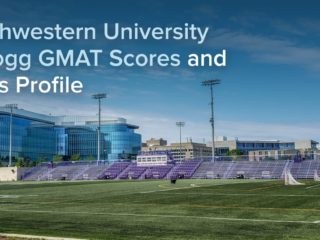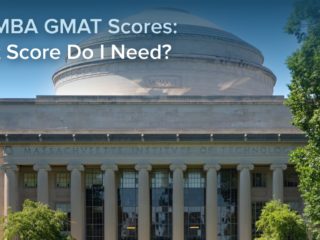| Getting your Trinity Audio player ready... |
MBA admissions at Ivy League schools are notoriously competitive, and admission to Columbia Business School is no exception. As a result, many prospective MBA students wonder, what GMAT score do I need for Columbia’s MBA program?
In this article, we’ll look at the average GMAT scores of MBA students at Columbia Business School. We’ll also take note of other key aspects of the 2026 incoming class profile. We’ll look at criteria to consider when determining what GMAT score will make you competitive for Columbia’s full-time MBA program.
Here are the topics we’ll cover:
- Does Columbia Require a GMAT Score?
- What Is the GMAT Score Required for Columbia?
- Columbia MBA GMAT Scores for the Class of 2026
- What GMAT Score Do I Need for Columbia?
- Key Takeaways
- What’s Next?
To start, let’s look at Columbia’s application requirements as they relate to test scores.
Does Columbia Require a GMAT Score?
For admission to Columbia University’s MBA program, all applicants must submit a valid GMAT, GRE, or Executive Assessment (EA) score.
So, while you must submit a test score, it does not necessarily have to be a GMAT score. If you’re unsure which test to take for MBA admissions, check out our article on whether to take the GMAT or GRE and this comparison of the GMAT and the Executive Assessment.
Keep in mind that, regardless of which test you take, you MUST submit your test score by the application deadline. So, make sure you plan ahead so that any scores you need to send reach the admissions office in time.
TTP PRO TIP:
Make sure that the Columbia Business School admissions office receives your GMAT score no later than the application deadline.
So, we now know that you need to submit a test score for admission to Columbia. This begs the question of whether Columbia requires a particular score.
What Is the GMAT Score Required for Columbia?
Columbia does not specify a certain threshold that your GMAT score must reach for you to be accepted. In fact, none of the M7 schools state a minimum GMAT score for acceptance.
The reason for this is that test scores are just one aspect of your overall application. MBA programs don’t admit students based on any one factor alone. Thus, an incoming MBA class may have students with a pretty wide range of GMAT scores.
With that in mind, let’s see Columbia’s MBA GMAT range and the average score of the incoming class of 2026.
Columbia MBA GMAT Scores for the Class of 2026
Columbia Business School reported the following GMAT score data for its MBA students who were admitted in 2024:
| Average GMAT Score | 732 |
| GMAT Score Range | 600-780 |
| Middle 80% GMAT Score Range (approx.) | 700-760 |
There are a few things to note about the data above. First, 732 is a pretty impressive average GMAT score, and it is the highest in CBS’ history. However, 732 is right in line with the average GMAT scores reported by other M7 schools. Those scores tend to fall in the 725-735 range.
Second, there is a sizable GMAT score range among accepted students–180 points! This goes to our earlier point that MBA programs evaluate applicants based on numerous factors. So, a particular test score is not the be-all and end-all that either guarantees or tanks your admission. Perhaps more importantly, this information indicates that what is considered a good GMAT score for one applicant may be very different from what is considered a good score for another applicant.
A particular test score is not the be-all and end-all that either guarantees or tanks your admission.
The Middle 80% Score Range
Given that variability, the GMAT score range of the middle 80% is a useful data point. The middle 80%, or “mid-80%,” is the score range within which 80% of people in a school’s class scored. In other words, 10% of the class scored above that range and 10% scored below it. So, the mid-80% range tells us what kinds of scores the vast majority of incoming MBA students achieved. Furthermore, this range tells us that admitted students scoring below 700 or above 760 had scores that were relative outliers.
Thus, the mid-80% range gives applicants a better sense of what score they may need to be on par with most of their competitors.
TTP PRO TIP:
Columbia’s mid-80% GMAT score range can give you a general sense of the type of score you’ll likely need to be on par with most other applicants.
Of course, who wants to just be “on par” with other applicants? You want to outshine your competitors, not blend into a sea of them, right? There’s also the matter of those outliers; can you shore up your acceptance by aiming for the top 10%? Should you worry if your score falls in the bottom 10%? Let’s discuss.
What GMAT Score Do I Need for Columbia?
There are many factors other than your GMAT score that affect admissions decisions. Your GPA, your personal and professional backgrounds, the competitiveness of the applicant pool that year, your recommendations, your essays, etc., are all important. So, there is no straightforward calculation for determining the exact GMAT score that will perfectly “balance” your profile.
The key point is that you should strive for balance in your profile when thinking about your needed GMAT score. Of course, higher is always better when it comes to the GMAT game. However, don’t neglect other aspects of your application because you’re focused on scoring a 790 you don’t really need.
So, let’s discuss how to balance these various factors.
Balancing Your GMAT Score with Other Factors
Determining what GMAT score you need to be competitive at Columbia is a matter of two things. First, you must consider the average GMAT score of MBA students in the program. Second, you must carefully analyze your strengths and weaknesses in other areas of your applicant profile.
For example, let’s say your applicant profile largely conforms to the “averages” of Columbia’s 2026 class profile. So, say you’re a white male with an undergraduate degree in business, a GPA of 3.5, and 5 years of work experience in the financial services sector. In that case, a GMAT score of 732 — right at the Columbia average — might not make your application stand out. All else equal, you may want to shoot for a score at the top of the mid-80% range, or even in the top 10%, to really give yourself an edge.
On the other hand, let’s say you’re a Hispanic woman with an undergraduate degree in the social sciences. You have a GPA of 3.9, and 8 years of work experience in government. In that case, the same score of 732 may make you a highly competitive candidate. This is because your profile is relatively unique and, in general, MBA programs seek students from a variety of backgrounds.
TTP PRO TIP:
To determine what GMAT score you need for Columbia, consider the average score and carefully analyze your strengths and weaknesses in other areas of your profile.
Determining Your Score Goal
Of course, there are no guarantees when it comes to MBA admissions. But generally speaking, a good rule of thumb is to shoot for a score that beats the Columbia Business School average GMAT score if you are part of an overrepresented group or industry. On the other hand, if you are part of an underrepresented group or industry, a safe play is to shoot for the average GMAT score.
Regardless of your background or industry, if your GPA or years of work experience are notably lower than the incoming class averages, consider aiming for a GMAT score that approaches the top end of the Columbia MBA GMAT range.
TTP PRO TIP:
Shoot for a score that beats the average GMAT score if you are in an overrepresented group or industry. Alternatively, shoot for the average score if you are in an underrepresented group or industry.
Remember, your GMAT can be a gold star or a red flag on your MBA application. So, when you’re applying to a school as selective as Columbia, putting in the time and energy it takes to earn a standout score will be well worth the effort!
Key Takeaways
- Columbia Business School requires a GMAT, GRE, or EA score for all applicants.
- There is no minimum GMAT score for CBS admission.
- The average GMAT score for the class of 2026 is 732, and the GMAT score range is 600-780.
- A balanced application is important. But if one (or more) part of your application is below average, you could offset it with a stellar GMAT score.
- If you are in an underrepresented group, you should shoot for a GMAT score at or above the average.
- If you are in an overrepresented group, you should shoot for a GMAT score that exceeds the GMAT average.
What’s Next?
You are most likely working full-time. You may be wondering how you can find the time and energy to prepare for the GMAT. Read our article about studying for the GMAT when working at a demanding job.
Good luck!



